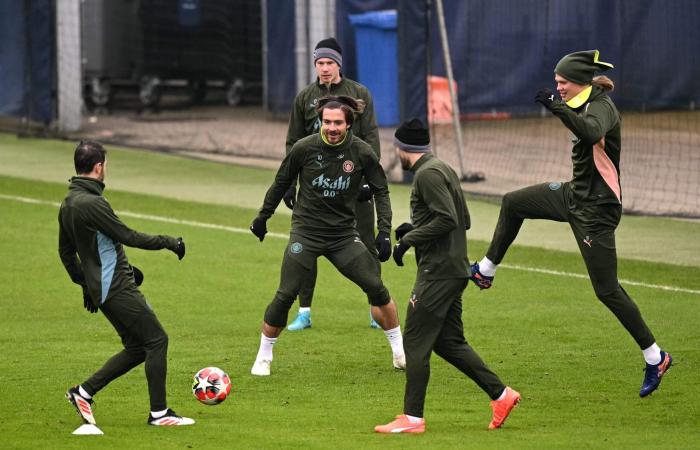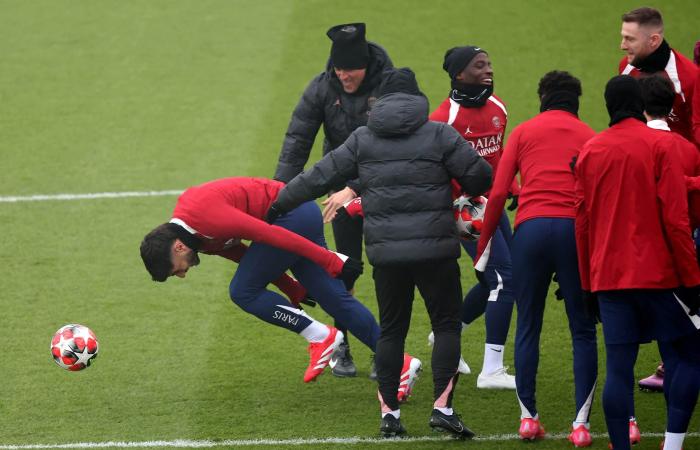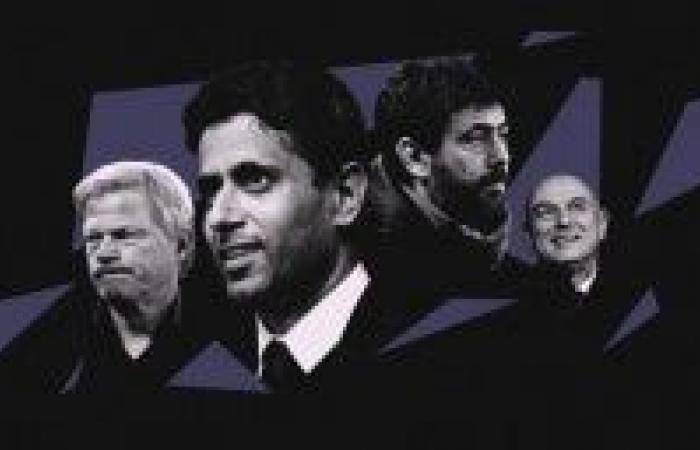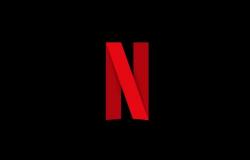In the modern setting of the Grimaldi Forum in Monaco, a television camera was trained on the Paris Saint-Germain delegation, waiting for a reaction.
And the latter was not long in coming. Club president Nasser Al-Khelaifi looked like he had seen a ghost, as did sporting director Luis Campos, who sat next to him.
Al-Khelaifi had been one of the staunchest defenders of the new Champions League format: more confrontations between the biggest clubs, more competition and excitement, he promised. However, looking at last year’s first round group stage draw, being matched up against Manchester City, Arsenal, Bayern Munich, Atlético Madrid and others in their eight games didn’t seem to fit the bill. his expectations.
He attempted to put on a stoic face afterwards, repeating to reporters how this season’s competition would be “incredible” and that although he considered PSG to have drawn the “hardest draw” among the With 36 clubs participating, he was excited about the challenge ahead.
Five months later, PSG find themselves in a disappointing 26th place in the Champions League table, struggling to try to qualify for next month’s play-off round after winning just two of their first six matches. Al-Khelaifi’s look of horror begins to seem justified.
However, PSG is not the only one in this situation. The last two European champions, Real Madrid and Manchester City, occupy 22nd and 24th positions respectively. Although Madrid are strongly tipped to progress, with matches against Red Bull Salzburg and Brest to conclude the group stage, tonight’s meeting between PSG and City at the Parc des Princes is fraught with an unusual challenge in this Champions League stadium.
These heavyweight clashes have been a welcomed feature of the competition this season, with no seeding system during the group stage. So far, these matches have seemed relatively relaxed — glamorous occasions with little risk, just the way big clubs want them.
This will mark the seventh meeting between PSG and City since their respective acquisitions by Qatar Sports Investments (QSI) and Sheikh Mansour bin Zayed Al Nahyan, vice-president of the United Arab Emirates, in 2011 and 2008. The stakes were much higher during their encounters in the Champions League quarter-finals in 2016 and the semi-finals four years earlier, with City winning both encounters. This time, the rewards are overshadowed by the risk of defeat.
Holders PSG are nine points clear at the top of Ligue 1 and remain unbeaten after 18 games in the French top flight this season, but their Qatari owners have never been truly satisfied with domestic success. Sportingly, their PSG project is judged almost solely on what they accomplish in the Champions League, a competition which Al-Khelaifi first mentioned the importance of winning by 2016, then 2018… It’s a goal that , despite the encouraging progress made over the last 18 months under coach Luis Enrique, seems further away than ever.
Manchester City training yesterday in Manchester (Oli Scarff/AFP/Getty Images)
PSG’s director of revenue, Marc Armstrong, told the BBC last season that, contrary to some of Al-Khelaifi’s statements in the past, the Champions League was “not an obsession” for them. “Would we like to win it? Yes,” he said, but added, “you don’t need to win the Champions League to be a successful club.”
Of course not. And City finally achieved it in 2023 by following a clear vision of football rather than an unhealthy obsession with “Champions League or nothing”. However, for PSG, trusting the process proved almost impossible. Supremacy in Ligue 1 has often been taken for granted (even if it hasn’t always been achieved), so marginal defeats in Europe often seem catastrophic.
There is, however, a preconceived notion about the legitimacy of the Qatari project at PSG (and similarly the Abu Dhabi project at City), which is not based solely on success in the Champions League. In reality, PSG and City are trophy assets, the acquisition of which can be seen as a reflection of the wider diplomatic, economic and strategic relations between France and Qatar, as well as between the United Kingdom and the United Arab Emirates. In this regard, PSG and City have already fulfilled their objective.

TO DISCOVER
Manchester City and Abu Dhabi: Triumphant passion project or geopolitical power play?
The last time the two clubs faced each other in the Champions League, during the 2021-22 group stage, diplomatic relations between the two Gulf nations had only just been restored after the Qatari diplomatic crisis. Ties have improved significantly since then, with increased cooperation on economic issues as well as the Israel-Gaza conflict.
A Qatari government statement earlier this week detailed conversations between Sheikh Mohammed bin Abdulrahman bin Jassim Al-Thani, its prime minister, and the Emirates’ foreign minister, Sheikh Abdullah bin Zayed Al Nahyan (brother of Sheikh Mansour). , discussing “the latest developments in Gaza and the occupied territories of Palestine, particularly in light of the ceasefire agreement and the exchange of detainees and prisoners.”
Both PSG and City have become showcases for Qatar and Abu Dhabi, respectively, but they also represent only a small part of a much bigger picture, as the Gulf region’s global influence — and the Europe’s financial dependence in this regard — continues to grow.
-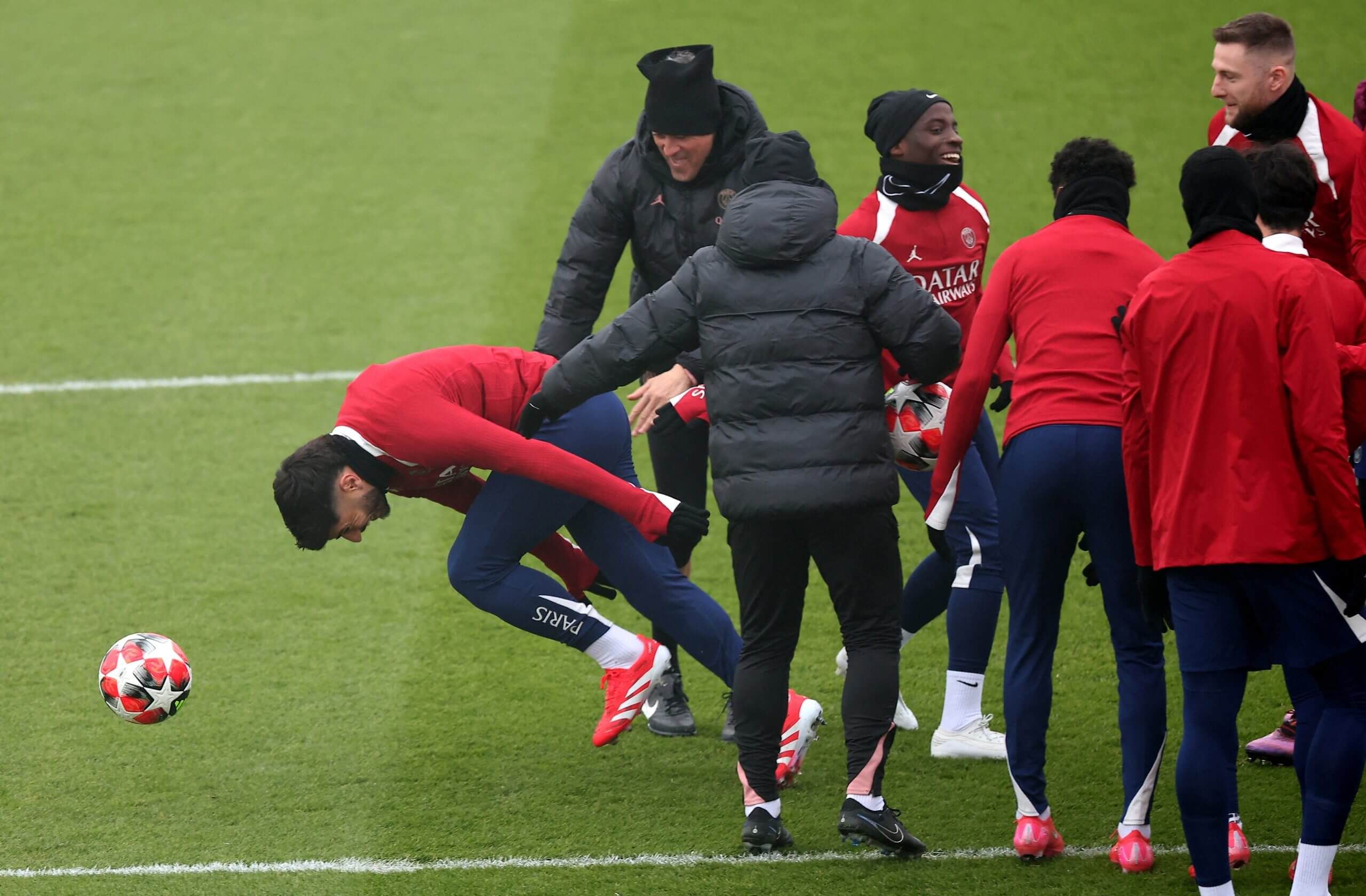
Paris Saint-Germain training in Paris yesterday before tonight’s match (Franck Fife/AFP/Getty Images)
The rivalry between PSG and City is, however, authentic.
Although the two clubs share a common grievance with UEFA, European football’s governing body, over the enforcement of Financial Fair Play (FFP) regulations, Al-Khelaifi sits on the club’s executive committee. UEFA since 2019 and became president of the European Club Association (ECA) in April 2021, capitalizing on his opposition to the failed European super league project that City and five other Premier League clubs had initially signed up for. City CEO Ferran Soriano was elected to the ECA board in 2023, having missed the opportunity two years earlier.
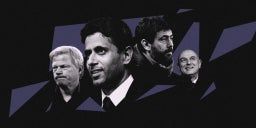
TO DISCOVER
Tension, mistrust and conspiracies – what happened after the collapse of the Super League
On the ground, the situation is different. The roles have been reversed since 2016, when, the day before the first match of this quarter-final at the Parc des Princes in Paris, Laurent Blanc, then PSG coach, suggested that “maybe in Europe, they (City) are a little behind us.” It seemed that way for a while, but this 3-2 aggregate defeat marked the end of White’s summer.
PSG reached the Champions League final in 2020 and the semi-finals the following year and again last season, but after the departure of many big names from the group, including Lionel Messi, Neymar and Kylian Mbappé, the Discussions now focus on a new project under Campos and Luis Enrique, focused more on the long term. PSG have enjoyed success, but the type of continuity that City have enjoyed under Pep Guardiola for the past nine years — despite the turbulence of recent months — remains elusive for now.
At the pre-match press conference on Tuesday, PSG striker Ousmane Dembélé called it the most important meeting since his €50m (£42.3m/£52.1m) transfer. dollars at the current exchange rate) from Barcelona in the summer of 2023. “We know we have to stay alive,” he said, aware that even beating City it might be necessary to get a result to Stuttgart in Germany next Wednesday to secure a place in this two-legged play-off in February.
“It’s a very special match because of the format of the competition,” said Luis Enrique. “It would have been difficult to imagine that Manchester City and PSG would only have this number of points after six games.”
This is certainly food for thought – and it remains to be seen whether this illustrates the strength of the format, the random nature of the fixtures or simply the local difficulties encountered by the two clubs this season.
Either way, tonight’s showdown in Paris — which Guardiola calls “a final” — is the type of event the Champions League needs.
It can’t just be the big clubs playing each other more often. There has to be stakes, something at stake, a sense of excitement and drama. This still requires these elite teams to significantly underperform, but so far in this competition, PSG and City have failed to deliver, making this encounter at the Parc des Princes anything but a low-stakes match.

TO DISCOVER
Vanity project: How money made Paris Saint-Germain blind to their city’s talent
(Top photos: Al-Khelaifi, left, and Sheikh Mansour; Getty Images)
Tonight’s meeting will undoubtedly illustrate the growing tension between performance on the ground and investor expectations. This dynamic raises questions regarding the relationship between sporting ambition and financial objectives. Here we are faced with an intriguing dilemma: how can a successful club sometimes face mixed results on the European scene, despite its colossal investments? In short, professional football has never been so involved in these economic and political issues, and the confrontation between PSG and City is one of the many examples.
Our editors use AI to help them deliver fresh items from trusted sources to our users. If you find any image or content that is inappropriate, please contact us via DMCA form and we will promptly remove it. / Our editors use AI to help them offer our readers fresh articles from reliable sources. If you find an image or content inappropriate, please contact us via the DMCA form and we’ll remove it promptly.
- --

